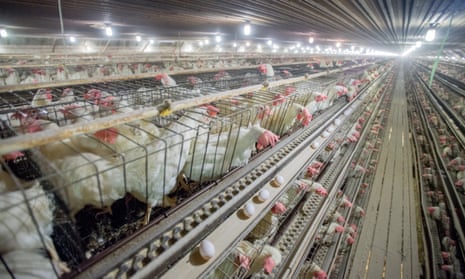Iowa grocery stores selling cage-free eggs may soon be required to stock eggs from battery hens as well.
The bill would affect two of Iowa’s largest supermarkets, HyVee and Fareway Stores, and national chains such as Walmart, CVS, Walgreens and Target, as well as smaller independent grocers. That’s because the bill is pegged to a government food-assistance program for low-income pregnant women, mothers and children, known as WIC. Stores that accept WIC vouchers would have to offer caged eggs alongside eggs that come from cage-free, free range or enriched colony cage environments.
Supporters say this is about making sure shoppers have access to affordable protein. “The cost can be four to five times cheaper for cage-produced eggs,” says Terry Baxter, an Iowa state representative and member of the House agriculture committee, which launched the bill. “For some families, not having the cheaper alternative could adversely affect their ability to feed their family on a tight budget.”
A fellow Republican state representative Chip Baltimore, who grew up on a farm, agrees. “When we start putting chicken’s rights over the right to affordable food for our families is the day we have our priorities all screwed up.”
But at a time when major chains such as Walmart are pledging to go cage-free, some have called the bill’s reliance on a government food program a “side-door workaround” to force stores to keep conventional eggs on shelves. Cody Carlson, a staff attorney with Mercy for Animals, says the industry is dragging its heels. “It is a desperate attempt to keep a dying industry alive. This is about the nation’s biggest egg producing state trying to create an artificial market.”
Carlson says his organization is “extremely concerned” the bill will become law, representing a major setback in the animal welfare movement. “As someone who monitors anti-animal legislation, it’s one of the strangest things I’ve ever seen. It would basically put us back to where we were 10 years ago, when it was a war between the industry and activists. We hope lawmakers in Iowa do the right thing.”
Nearly one in five eggs in the US come from Iowa’s 60 million hens. Asked if dictating what a grocery store sells goes against the spirit of the free market, Kevin Stiles, the executive director of the Iowa Egg Council, says “I think it’s actually the opposite.”
“This bill is in response to pressure put on grocers by outside groups trying to push their own agendas to only offer cage-free eggs. Most grocery stores want to offer consumer choice.”
Battery cages are legal in the state.
The bill was introduced in February and swiftly passed the House. It passed the Senate on 5 March and is now headed for the governor’s desk.
